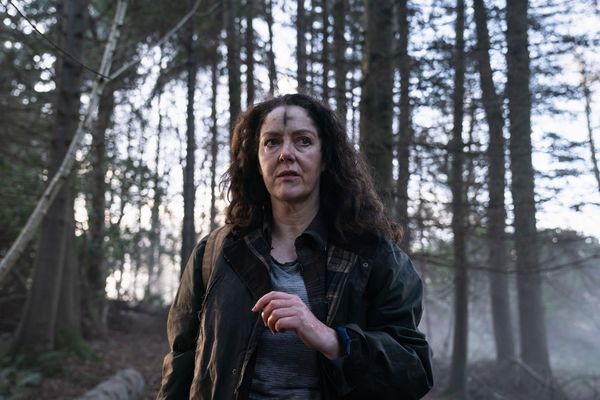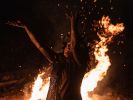Eye For Film >> Movies >> Mandrake (2022) Film Review
Mandrake
Reviewed by: Jennie Kermode

In a prison system founded on the idea that people can change during their incarceration, rehabilitation into the community eventually happens even to killers, and at first glance the case of ‘bloody’ Mary Laidlaw, no matter how much her neighbours hate her, might attract some sympathy. She killed her husband after apparently receiving horrific injuries at his hands, and she still bears the scars. Is she really a danger to anyone else? Parole officer Cathy Madden (Dierdre Mullins) is used to dealing with young men who will almost certainly reoffend, and in the opening scenes we see that she has to reckon with physical risks in the course of her job. Driving down to a sleepy little village to keep track of a fiftysomething woman seems likely to be easier work, but director Lynne Davison isn’t about to let viewers relax. Everything about the place looks ominous.
It’s in the gnarled and twisted branches of the trees, the thick, dark foliage overhead. It’s in the dark earth obscured by low-growing foliage where traps might be hidden, and in the moss that clings to everything. Mary’s house looks like something organic, clinging low to the ground, its pale walls stained by the encroachment of damp and fungus. Inside, Cathy shivers: there’s no modern heating system. The kitchen is filled with branches, fragments of plants and jars full of dried or pickled items. And then there’s Mary herself (Derbhle Crotty), her face and hands dirty,, her long dark hair wild and tangled, her eyes sharp. She asks very personal questions, obliging Cathy to be firm about her professional boundaries. She speaks of a mysterious man who once took her out dancing on the moss.

For all her experience, Cathy is disquieted, but it’s her job to make rational assessments and resist giving way to prejudice. Things get worse, however, when two local children go missing and the villagers are convinced that Mary must be responsible. The film doesn’t leave much room for hope, but it does present viewers with a shifting moral landscape in which motivations are tricky to pin down. There is witchcraft involved here, alright, but it’s not a simple matter of good versus evil – it’s much more uncomfortable than that. Importantly, even when we don’t know why Mary is doing what she does, it’s clear that she’s following a path which seems logical to her, and it gradually begins to make more sense to Cathy, too, even if she would rather it didn’t.
This sense of internal logic stems partly from Davison’s and writer Matt Harvey’s meticulous research which, whilst it mingles elements from different traditions, is always clear about specific process, including the proper harvesting and use of mandrake, one of the most powerful ingredients in any kind of spellcraft. The film is also heavily focused on the idea of female and maternal power, and as such carries a weight of history relating to the real reason why some of these practices were suppressed. Drawing on something which existed centuries before modern feminism, Mary has found a means of self-actualisation which she is not above sharing with others. It’s her unbreakable sense of her own nature, as much as any ritual or potion, which gives her power.
Crotty is excellent in this complicated role, her dark charisma dominating the film. Mullins has a tough job holding audience attention whilst sharing the screen with her, but still convinces in her role and makes us root for her when she’s in danger. There is a sense of danger here, however, which is less personal than cultural. Mandrake is an intensely atmospheric piece of work, built up from a myriad acutely observed details. You’ll need to pay close attention to fully appreciate the ending, and remember that, like those tangled trees, stories and lives, skeins and skins intertwine.
Reviewed on: 12 Mar 2022
















